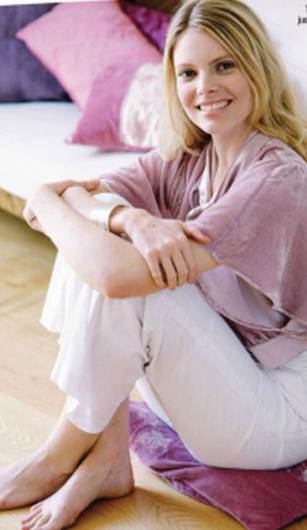Days 15-21 Change your thinking
‘People get very hung up on the amount of
sleep they get and the implications of not getting enough. This leads to more
anxiety, which in turn interferes with sleep’, says Dr Jacobs. Here, he reveals
the truth about the most common sleep beliefs and myths:
I
need eight hours sleep to stay healthy. Untrue.
Many people are fine on six hours and there’s lots of research to show that
people who get seven hours a night live the longest.
On my
bad night I never sleep a wink. Unlikely. Research
shows that when chronic insomniacs are studied in sleep labs, on average they
overestimate the time it takes them to fall asleep by 30 minutes and
underestimate total sleep time by an hour.
I’ll
never be able to function tomorrow. Untrue.
Evidence shows that most people maintain pretty normal function on about 70% of
their normal sleep. And other research shows that if people get core sleep,
daytime performance doesn’t suffer significantly.
I
haven’t slept for weeks. Unlikely. Many people have
had nights, but they don’t generally come one after the other.
Now, write down your negative sleep
thoughts and then write a more realistic statement next to it. If you can
reframe what you think about your sleep you’ll reduce your anxiety and
ultimately improve your sleep.

Take
time out: just 10 minutes’ relaxation may help
Days 22- 28 Learn to relax
Stress is a major sleep stealer. It’s a
simple equation. High levels of stress trigger the release of hormones that put
your body on alert – and research shows that hormone levels can stay raised
throughout the night. Dr Jacobs’ research shows that relaxation produces brain
wave patterns similar to stage-one sleep – the transition time between being
fully awake and sleeping.
Find the method of relaxation that works
best for you and try to practice for about 10 minutes every day this week.
Don’t use it in bed before sleep or to get back to sleep until you have
mastered the technique and can achieve relaxation. Simple approaches to try
include:
·
Progressive muscle relaxation
Sit or lie somewhere warm and quite.
Starting with your feet, focus on a particular muscle group and then inhale and
squeeze the muscle hard for about 10 seconds. Release the tension and stay with
the muscle relaxed for about 15 seconds before moving upwards through your body
to the next muscle group, right up to your head.
·
Deep focused breathing
Sit or lie somewhere comfortable and quite.
Breathe in deeply and slowly through your nose, allowing your chest and lower
abdomen to rise. Put your hand on your abdomen and feel it expand as you
breathe in. now breathe out slowly through your mouth, focusing on the breath.
It might help to have a word, phrase or relaxing image to focus o as you breath
out.
Banish the sleep stealers
These simple lifestyle changes can help
improve your sleep
Gentle exercise from three to six hours
before bed will aid sleep. Exercising closer to bedtime can hinder sleep.
Avoid nicotine and caffeinated drinks (tea,
coffee ad colas) before bed.
Alcohol may help you sleep initially, but
will lead to more fragmented sleep in the second half of the night.
Ensure your bed is comfortable, your
bedroom is dark, quite and not too warm.
Suffer from indigestion? Avoid eating close
to bedtime and steer clear of fatty, gassy foods that could cause problems.
Is something interfering with your
sleep?

Take
control and get what you want in bed… quality sleep
Getting a good night’s sleep can also be
hampered by physical problems.
Restless legs You might have pins and
needles, an unpleasant crawling sensation and the urge to keep moving your
legs. Keep your legs cool – a fan at the foot of the bed can help. If it’s a
persistent problem, though, see your GP as restless legs can be due to iron
deficiency or be a side-effect of certain drugs. Menopausal sweats These can
seriously disrupt sleep. Keep your bedroom cool, wear light night clothes and
use light bed coverings. HRT is effective at treating flushes.
Sleep apnoea This occurs when your
breathing stops hundreds of times during the night and you wake gasping for
breath. Telltale signs are loud snoring and unexplained daytime sleepiness.
Sleep apnoea becomes five times more common in women post-menopause and is
potentially dangerous as it can lead to high blood pressure. Always see your
doctor if you are concerned.
Are pills a remedy?
Around 9 million prescriptions for sleeping
pills are doled out each year, but research suggests we shouldn’t be relying on
them. A major study published earlier this year linked sleeping pills to
premature death and an increased risk of cancer – and the study’s lead author,
Dr Danniel Kripke, said that taking sleeping pills could be as dangerous as
smoking cigarettes. What’s more, research suggests that pills don’t actually
cure insomnia – just treat the symptoms. In his book, Say Good Night To
Insomnia, Dr Gregg Jacobs quotes a study funded by the US National Institutes
of Health, which found that people who took prescription sleeping tablets fell
asleep just 12 minutes faster than those who took a placebo – and slept just 11
minutes more.
Know your sleep cycle
Your body goes through four to six sleep
cycles of around go minutes every night, each consisting of the four stage of
non-REM (rapid eye movement) sleep followed by REM sleep. Sleep tends to be
lighter in the second half of the night, so there’s more chance of waking up.
Non-REM (NREM) sleep is the restorative
sleep when your body is really resting and the higher levels of your brain are
cut off. There are four phases of NREM sleep. In stage one you sleep lightly,
drifting in and out of sleep, your muscles begin to slow down and eyes move
very slowly. By stage two your muscles are relaxed and your brain waves slow
down. Stages three and four are deep sleep when it’s hardest to wake up. It’s
being deprived of deep sleep that has the most negative impact on daytime
functioning.
During REM or dreaming sleep your muscles
are paralyzed, apart from the muscles of your eyes, which move rapidly, and
vital muscles like your diaphragm, which enables you to breathe.